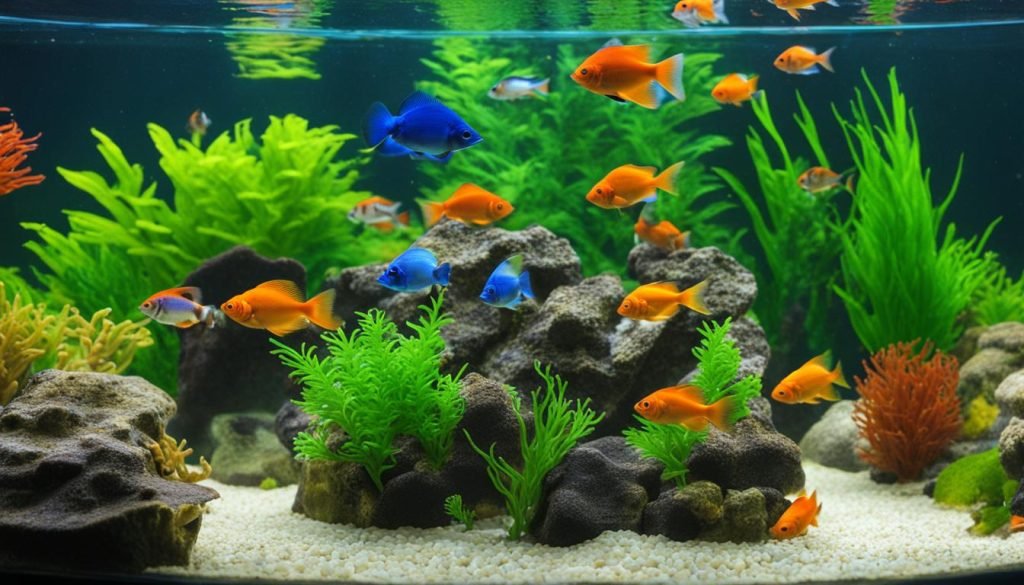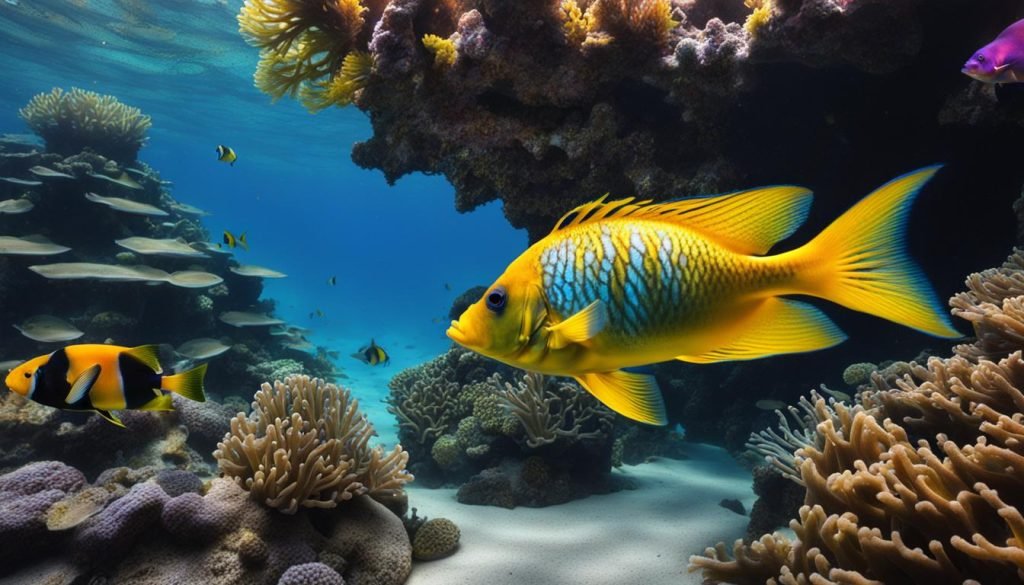How Long Do Fish Live: Average Lifespan of Fish
Fish are fascinating creatures, with varied lifespans that depend on different factors. Some species can live for decades, while others only survive for a few years.
So, how long do fish live on average? The answer may surprise you. The lifespan of fish varies greatly depending on their species, genetics, and environment. Some species of fish can live for several decades, while others may only survive for a few months.
It’s essential to understand the average lifespan of fish and the factors that contribute to their longevity. Knowing more about how long fish live can help aquarium owners care for their fish better and help conservationists protect endangered fish species.
Key Takeaways:
- The lifespan of fish varies greatly depending on factors such as species, genetics, and environment.
- Some fish species can live for several decades, while others may only survive for a few months.
- Understanding the average lifespan of fish is crucial for aquarium owners and conservationists.
- Caring for fish properly can help extend their lifespan in captivity.
- Protecting endangered fish species is essential for maintaining healthy aquatic ecosystems.
Fish Quiz
How well do you know fish? Test your knowledge here!

Fish Lifespan in Captivity

Have you ever wondered how long your pet fish can live in an aquarium? Fish lifespan in captivity can vary depending on a variety of factors, including water quality, diet, tank size, and genetics.
Aquarium fish are not exempt from the effects of aging that impact all living organisms. However, a well-maintained aquarium may allow fish to live longer than they would in the wild.
A study conducted by the University of Guelph found that fish in well-maintained aquariums live an average of 10 years, whereas fish in standard aquariums live an average of 5 years. The study also found that within the same species, genetic differences can affect lifespan in captivity. Hence, some individuals may live much longer than others.
Table: Factors that can affect fish lifespan in captivity
| Factor | Impact on fish lifespan in captivity |
|---|---|
| Water quality | High-quality water can promote fish health and longevity, while poor water quality can lead to disease and early death. |
| Diet | A balanced and nutritious diet can support fish growth and promote longevity, whereas an unhealthy diet can limit growth and increase the risk of disease. |
| Tank size | A larger tank can offer more space and resources for fish, reducing their stress and promoting a healthy environment. |
It is essential to provide fish with a healthy, comfortable environment that meets their specific needs to maximize their lifespan in captivity.
In summary, fish lifespan in captivity can vary depending on several factors. With proper care and a suitable environment, fish can live longer than they would in the wild.
Fish Lifespan in the Wild

Unlike fish in captivity, fish in the wild are subject to a wide range of environmental conditions that can impact their lifespan. The lifespan of fish in the wild varies greatly depending on the species, with some species living only a few years and others living for several decades.
One of the primary factors that can affect the lifespan of fish in the wild is predation. Fish are preyed upon by a range of animals, including birds, mammals, and other fish. This constant threat of predation can significantly reduce the lifespan of fish, particularly for smaller species that are lower on the food chain.
Another factor that can impact fish lifespan in the wild is reproduction. Many fish species have a limited lifespan due to the high energy demands of reproduction, which can cause significant wear and tear on the body. Additionally, fish that migrate long distances to mate can also face additional environmental challenges that can reduce their lifespan.
Despite the challenges faced by fish in the wild, some species have adapted remarkable strategies to maximize their lifespan. For example, the Greenland shark has been found to live for over 400 years, making it one of the longest-living vertebrates on Earth. One theory suggests that the shark’s slow metabolism and low activity level may contribute to its exceptional longevity.
Overall, understanding the lifespan of fish in the wild is critical for conservation efforts. By studying the factors that impact fish lifespan, we can gain insights into how to better protect and preserve fish populations for future generations.
How Long Do Fish Live: Factors Affecting Fish Lifespan

Several factors can impact the lifespan of fish, from genetics to environmental conditions and human activities. Understanding these factors is critical to maintaining healthy aquatic ecosystems and preserving fish populations.
Genetics
Just like in humans, genetics can play a role in determining the lifespan of fish. Some fish species, such as the Greenland shark and the bowhead whale, are known for their exceptional lifespans, which can exceed centuries. Researchers have discovered that these species possess genetic adaptations that protect their cells and tissues from damage over time.
However, genetic diversity can also impact the longevity of fish populations. Inbreeding can increase the risk of genetic disorders and reduce the survivability of fish offspring, ultimately limiting the lifespan of the species.
Environmental Conditions
Water temperature, water quality, and habitat availability are some of the environmental factors that can impact the lifespan of fish. Water temperature can influence the rate of fish metabolism, affecting how fast they grow and age. Poor water quality, such as low oxygen levels, can also contribute to fish mortality, making it more challenging for them to survive and reproduce.
Habitat availability is also critical to fish survival. Overfishing, pollution, and habitat destruction can all reduce the availability of suitable habitats for fish, ultimately limiting their lifespan.
Human Activities
Human activities can have a significant impact on fish populations, including their lifespan. Overfishing, for example, can reduce the number of fish in a population, making it harder for them to reproduce and maintain genetic diversity. The destruction of fish habitats, such as coral reefs and wetlands, can also lead to a decline in fish populations and impact their lifespan.
Climate change is another human activity that can impact fish lifespan. Rising temperatures and changing ocean currents can impact the availability of prey, migration patterns, and reproduction, ultimately affecting the longevity of fish species.
“The combination of overfishing, pollution, and climate change is impacting fish populations worldwide,” says marine biologist Jane Smith. “It’s essential that we take action to protect these species and their habitats if we want to maintain healthy oceans for future generations.”
Longest Living Fish Species
While the typical lifespan of most fish species ranges from a few years to a decade, some of the longest-living fish can survive for over a century. These remarkable creatures have developed adaptations that enable them to thrive in challenging environments and withstand the test of time.
Greenland Shark
The Greenland shark holds the impressive title of the longest-living vertebrate, with a lifespan that can exceed 400 years. This massive shark can grow up to 20 feet long and is found in the icy waters of the Arctic and sub-Arctic regions. The slow metabolism of the Greenland shark, combined with its low activity levels, contributes to its extraordinary longevity.
Olive Ridley Sea Turtle
The Olive Ridley sea turtle is another species with impressive longevity, thanks to its remarkable adaptations. These turtles can live for up to 100 years and are found mainly in the warm waters of the Pacific, Indian, and Atlantic Oceans. They have a unique ability to navigate and return to their birthplace to lay eggs, with some individuals making the journey back to their original nesting site for over 50 years.
Rockfish
Rockfish is an umbrella term for a variety of fish species that inhabit rocky ocean bottoms. Some of the species within this group can live for up to 200 years, making them some of the longest-living fish known to science. These creatures have slow growth rates, and low reproductive rates, and are often caught in fishing nets, contributing to their decline in some regions.
Bowhead Whale
The bowhead whale is another remarkable creature renowned for its exceptional lifespan. These massive mammals can reach lengths of up to 60 feet and are found in the Arctic and sub-Arctic regions. Scientists have estimated the lifespan of bowhead whales to be around 200 years, making them one of the oldest living mammals. Their thick blubber layer provides insulation in cold waters and enables them to survive for decades in harsh environments.
Overall, the longevity of these fascinating fish species underscores the importance of protecting our oceans and the diverse communities that call them home. By promoting sustainable fishing practices and conservation efforts, we can help to ensure that these remarkable creatures continue to thrive for generations to come.
Fish Longevity and Conservation

The study of fish longevity is crucial for informing conservation efforts and maintaining healthy aquatic ecosystems. Fish with longer lifespans are often key species in their respective habitats, playing vital roles in nutrient cycling, population control, and ecosystem stability.
Unfortunately, many fish populations are under threat due to overfishing, habitat destruction, and pollution. Some fish species, including those with longer lifespans, are particularly vulnerable to these threats due to their slow growth rates and late maturation periods.
Conservation efforts must take into account the unique lifespan and reproductive traits of different fish species. For example, some long-lived fish, such as sturgeon and salmon, require specific habitats for spawning and rearing their young. Protecting these habitats and implementing sustainable fishing practices can help ensure the survival of these valuable species.
Furthermore, understanding fish longevity can also help us predict and mitigate the effects of climate change on aquatic environments. As water temperatures and pH levels shift, some fish species may be more resilient than others. By studying the lifespan and physiology of different fish species, we can identify those that may be most at risk and develop strategies to protect them.
In conclusion, the study of fish longevity is essential for maintaining healthy aquatic ecosystems and protecting vulnerable fish populations. By combining our knowledge of fish biology with sustainable conservation practices, we can ensure that these fascinating and important creatures continue to thrive for generations to come.







